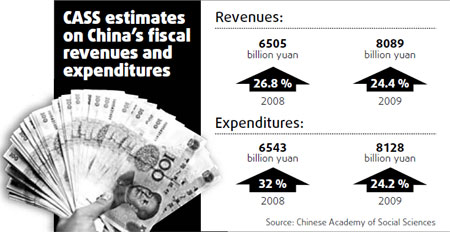
|
BIZCHINA> Review & Analysis
 |
|
China must maintain slow approach in opening up financial sector
By Yan Qifa and Tang Ping (China Daily)
Updated: 2008-12-29 07:49
The still-evolving global financial crisis has provided much food for thought for a fast-growing economy such as China. The crisis should not stop the country from continuing its opening up policy, but it should re-consider the tempo of the drive.
The global crisis has hit the world economy hard and offered equally hard lessons, one of which is that the theoretical circle has failed to conduct adequate precautionary research and ring an alarm bell before a substantial crisis happened. In recent years, the continually prosperous real estate market in the developed world has brought handsome profits to both banks relying on sub-prime and other derivative products and the public who gain from rising house prices. They, therefore, have "rationally" ignored potential risks. The researchers, however, should not have been that ignorant. After the crisis surfaced, many researchers failed to correctly diagnose the problem. Initially, for example, many international organizations, including the International Monetary Fund, argued that the US economy would not be trapped in a prolonged crisis thanks to its resilience. The US government has made a major mistake, too. It thought that the crisis was one caused by lack of liquidity instead of confidence, and therefore it opted to inject liquidity to try to solve it. Moreover, when Lehman Brothers was on the brink of bankruptcy, it refused to bail it out, triggering a collapse of market confidence in the financial institutions. When Washington later realized the dangerous nature of the crisis and started to take forceful measures to combat it, the US economy slid into a cycle of recession, unemployment and default of payment. Both Chinese academic circles and government should draw lessons from the US. It is fair to say that China's timely release of its $586 billion economic stimulus package has something to do with the US failure to react promptly to the crisis. Two schools of thoughts basically guide the current economic policy-making of the world's economies. One advocates free market and free competition with little government intervention. The other one promotes active intervention of the government in the economy as the "invisible hand" of the market may lead to "market failure". Both are applicable in certain periods of time and we should not run to an extreme. There is an opinion that the free market is responsible for the financial crisis and the world should resort to government intervention in the market. Excessive intervention, however, can also harm the economy. The crisis is actually a result of excessive "innovation" and lack of proper regulation. The US has allowed quite a lot of complicated financial innovations in the past decade while regulators have failed to make financial institutions transparent enough to subject them to proper regulation. For China, regulators must prevent excessive use of financial leverages, put more emphasis on international regulatory cooperation, and experiment with a regulatory regime that caters to China's realities. In a word, regulators should strike a balance between financial innovation and regulation. China, above all, should make efforts to prevent potential systematic risks in the banking sector. Given China's immature capital market, 80 percent of enterprises' borrowings come from indirect financing, or bank loans. If banks encounter major risks, they will have a major impact on the national economy as well as people's livelihood and even social stability. In recent years, Chinese banks' balance sheets have seen much improvement thanks to continual banking reforms. However, with the global financial crisis deepening and domestic economic growth slowing, policymakers must pay more attention to the potential risks the banks are facing. In the mean time, policymakers must become more cautious in dealing with the country's financial opening up. China's financial opening up drive has been quite bold in recent years. By the end of last year, 21 foreign banks have become locally incorporated banks in China while 193 banks from 47 countries and regions have established their representative offices in the country. A total of 82 foreign banks have been allowed to conduct renminbi business. China's financial opening up is faster than many developed countries. However, the global financial crisis reminds us that a major element in deciding the pace of financial opening up is whether it is conducive to the stability of the national economy and the soundness of the financial system and whether it contributes to effective financial regulation. Therefore, in opening up its financial sector and reforming its exchange rate policy, China must adopt a gradualist approach to prevent a new crisis. Seen from past experiences of the world, the financial systems of developing countries are often weak and subject to attack of international speculators. Therefore, the pace of opening up must be in line with its development stage and economic strength to ensure the economic security of those countries. In the 1980s and 1990s, some South American countries suffered serious financial crises and paid costly prices. We must draw lessons from them. Yan Qifa is deputy head of the economic research department of the Export-Import Bank of China; Tang Ping is economist of the economic research department of the bank.
 (For more biz stories, please visit Industries)
|
久久久无码人妻精品无码_6080YYY午夜理论片中无码_性无码专区_无码人妻品一区二区三区精99